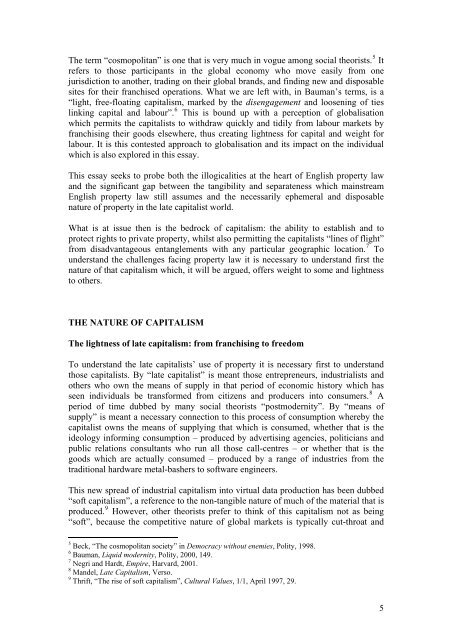The Unbearable Lightness of Property - alastairhudson.com
The Unbearable Lightness of Property - alastairhudson.com
The Unbearable Lightness of Property - alastairhudson.com
You also want an ePaper? Increase the reach of your titles
YUMPU automatically turns print PDFs into web optimized ePapers that Google loves.
<strong>The</strong> term “cosmopolitan” is one that is very much in vogue among social theorists. 5 It<br />
refers to those participants in the global economy who move easily from one<br />
jurisdiction to another, trading on their global brands, and finding new and disposable<br />
sites for their franchised operations. What we are left with, in Bauman’s terms, is a<br />
“light, free-floating capitalism, marked by the disengagement and loosening <strong>of</strong> ties<br />
linking capital and labour”. 6 This is bound up with a perception <strong>of</strong> globalisation<br />
which permits the capitalists to withdraw quickly and tidily from labour markets by<br />
franchising their goods elsewhere, thus creating lightness for capital and weight for<br />
labour. It is this contested approach to globalisation and its impact on the individual<br />
which is also explored in this essay.<br />
This essay seeks to probe both the illogicalities at the heart <strong>of</strong> English property law<br />
and the significant gap between the tangibility and separateness which mainstream<br />
English property law still assumes and the necessarily ephemeral and disposable<br />
nature <strong>of</strong> property in the late capitalist world.<br />
What is at issue then is the bedrock <strong>of</strong> capitalism: the ability to establish and to<br />
protect rights to private property, whilst also permitting the capitalists “lines <strong>of</strong> flight”<br />
from disadvantageous entanglements with any particular geographic location. 7 To<br />
understand the challenges facing property law it is necessary to understand first the<br />
nature <strong>of</strong> that capitalism which, it will be argued, <strong>of</strong>fers weight to some and lightness<br />
to others.<br />
THE NATURE OF CAPITALISM<br />
<strong>The</strong> lightness <strong>of</strong> late capitalism: from franchising to freedom<br />
To understand the late capitalists’ use <strong>of</strong> property it is necessary first to understand<br />
those capitalists. By “late capitalist” is meant those entrepreneurs, industrialists and<br />
others who own the means <strong>of</strong> supply in that period <strong>of</strong> economic history which has<br />
seen individuals be transformed from citizens and producers into consumers. 8 A<br />
period <strong>of</strong> time dubbed by many social theorists “postmodernity”. By “means <strong>of</strong><br />
supply” is meant a necessary connection to this process <strong>of</strong> consumption whereby the<br />
capitalist owns the means <strong>of</strong> supplying that which is consumed, whether that is the<br />
ideology informing consumption – produced by advertising agencies, politicians and<br />
public relations consultants who run all those call-centres – or whether that is the<br />
goods which are actually consumed – produced by a range <strong>of</strong> industries from the<br />
traditional hardware metal-bashers to s<strong>of</strong>tware engineers.<br />
This new spread <strong>of</strong> industrial capitalism into virtual data production has been dubbed<br />
“s<strong>of</strong>t capitalism”, a reference to the non-tangible nature <strong>of</strong> much <strong>of</strong> the material that is<br />
produced. 9 However, other theorists prefer to think <strong>of</strong> this capitalism not as being<br />
“s<strong>of</strong>t”, because the <strong>com</strong>petitive nature <strong>of</strong> global markets is typically cut-throat and<br />
5 Beck, “<strong>The</strong> cosmopolitan society” in Democracy without enemies, Polity, 1998.<br />
6 Bauman, Liquid modernity, Polity, 2000, 149.<br />
7 Negri and Hardt, Empire, Harvard, 2001.<br />
8 Mandel, Late Capitalism, Verso.<br />
9 Thrift, “<strong>The</strong> rise <strong>of</strong> s<strong>of</strong>t capitalism”, Cultural Values, 1/1, April 1997, 29.<br />
5













